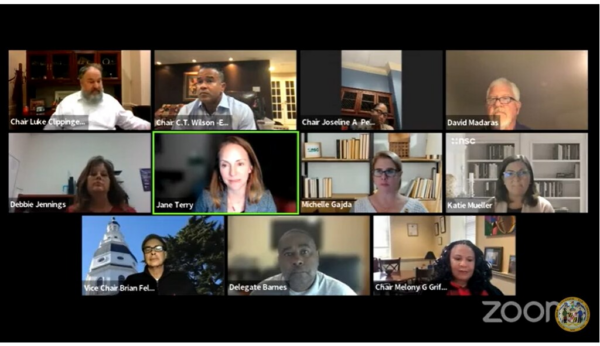This article was republished with permission from WTOP’s news partners at Maryland Matters. Sign up for Maryland Matters’ free email subscription today.
This content was republished with permission from WTOP’s news partners at Maryland Matters. Sign up for Maryland Matters’ free email subscription today.

As Maryland lawmakers continue to gather information to craft legislation on the legalization of cannabis, they learned more this week on how the drug can have an impact on a person’s job.
The House of Delegates’ Cannabis Referendum and Legalization work group held a briefing Tuesday to hear about ways to improve workplace safety in the era of legalized cannabis.
Jane Terry, vice president of government affairs for the National Safety Council, said various studies show vehicle crash rates increased after legalization of cannabis.
Terry said the council, headquartered in Itasca, Illinois, doesn’t take a position on legalization. But she summarized some proposed legislation Maryland lawmakers could implement to decrease vehicle crashes and road fatalities before recreational use becomes legal in July. Some of them include:
- Improving oral fluid roadside testing to test for drivers possibly under the influence of cannabis.
- Better toxicology data and testing for vehicles involved in fatal crashes, especially for THC, or tetrahydrocannabinol, a chemical compound in cannabis that produces “the high sensation.”
- Improving training for the entire legal system to understand cannabis.
“What we really want to drive home is that it is impairing when you use it and that it can have safety impacts,” Terry said.
One of the council’s regional affiliates, the Chesapeake Region Safety Council based in Baltimore County, works with “high-hazard” businesses such as construction companies. Dave Madaras, president of the Chesapeake Region Safety Council, said the construction industry represents 5% of the nation’s workforce but 20% of workplace fatalities.
He said some of those workers that are employed in “safety-sensitive positions” like crane operators, signalers and electricians use medical cannabis for various health purposes. Because they are subject to drug and alcohol testing, it could lead to them possibly losing their jobs.
“The concern we have is…if they’re using it, they come to work and they take a drug screen and they come up positive based on a urinalysis, it does not mean that they’re impaired,” he said. “It just means they have the THC metabolite in their system enough to trip the drug test.”
To increase safety in the workplace, on the roads and in the community, the Chesapeake council conducts cannabis training with the group’s safety personnel. Law enforcement officials also participate and manage some classes for law enforcement trainees.
Madaras said volunteer members who have cannabis medical cards use the drug during training sessions at its facility. The council has provided transportation for each person who has participated in the dozen exercises held so far.
Some of the sessions include a briefing on cannabis, an assessment of the type of impairment a person may have, and probe why each person uses cannabis.
“We are trying to develop a solid impairment recognition program for our safety professionals,” Madaras said.
Lawmakers were also told by members of the National Safety Council that they are evaluating business and safety impacts on treatment, insurance, operating equipment and productivity.
Some policy solutions include allowing workplace drug testing to include cannabis, allowing employers to define what jobs are “safety-sensitive” and increase treatment capacity for workers.
Del. C.T. Wilson (D-Charles) said the recommendations would protect a certain class of worker who uses cannabis and “shouldn’t be fired or shouldn’t be tested.”
Del. Jheanelle Wilkins (D-Montgomery) said testing on THC and trying to assess levels of impairment could have a negative effect on drivers, especially those who impaired.
Terry with the national safety council said there’s isn’t a science to setting a THC limit and recommends the state not set a statute. She said improved toxicology testing would help provide a better knowledge of what substances people are using while driving.
“Just in general, we want a better understanding of what impairing substances people are using on the roads,” she said. “We [must] have a more robust testing system that we really don’t have today.”
The cannabis work group will meet again at 1 p.m. on Jan. 5, six days before the 90-day legislative session convenes.







